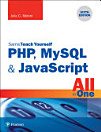The Joy of Clojure
mai 2014 · Simon and Schuster
E-book
520
Pages
family_home
Éligible
info
reportLes notes et avis ne sont pas vérifiés. En savoir plus
À propos de cet e-book
Summary
The Joy of Clojure, Second Edition is a deep look at the Clojure language. Fully updated for Clojure 1.6, this new edition goes beyond just syntax to show you the "why" of Clojure and how to write fluent Clojure code. You'll learn functional and declarative approaches to programming and will master the techniques that make Clojure so elegant and efficient.
Purchase of the print book includes a free eBook in PDF, Kindle, and ePub formats from Manning Publications.
About the Technology
The Clojure programming language is a dialect of Lisp that runs on the Java Virtual Machine and JavaScript runtimes. It is a functional programming language that offers great performance, expressive power, and stability by design. It gives you built-in concurrency and the predictable precision of immutable and persistent data structures. And it's really, really fast. The instant you see long blocks of Java or Ruby dissolve into a few lines of Clojure, you'll know why the authors of this book call it a "joyful language." It's no wonder that enterprises like Staples are betting their infrastructure on Clojure.
About the Book
The Joy of Clojure, Second Edition is a deep account of the Clojure language. Fully updated for Clojure 1.6, this new edition goes beyond the syntax to show you how to write fluent Clojure code. You'll learn functional and declarative approaches to programming and will master techniques that make Clojure elegant and efficient. The book shows you how to solve hard problems related to concurrency, interoperability, and performance, and how great it can be to think in the Clojure way.
Appropriate for readers with some experience using Clojure or common Lisp.
What's Inside
About the Authors
Michael Fogus and Chris Houser are contributors to the Clojure and ClojureScript programming languages and the authors of various Clojure libraries and language features.
Table of Contents
The Joy of Clojure, Second Edition is a deep look at the Clojure language. Fully updated for Clojure 1.6, this new edition goes beyond just syntax to show you the "why" of Clojure and how to write fluent Clojure code. You'll learn functional and declarative approaches to programming and will master the techniques that make Clojure so elegant and efficient.
Purchase of the print book includes a free eBook in PDF, Kindle, and ePub formats from Manning Publications.
About the Technology
The Clojure programming language is a dialect of Lisp that runs on the Java Virtual Machine and JavaScript runtimes. It is a functional programming language that offers great performance, expressive power, and stability by design. It gives you built-in concurrency and the predictable precision of immutable and persistent data structures. And it's really, really fast. The instant you see long blocks of Java or Ruby dissolve into a few lines of Clojure, you'll know why the authors of this book call it a "joyful language." It's no wonder that enterprises like Staples are betting their infrastructure on Clojure.
About the Book
The Joy of Clojure, Second Edition is a deep account of the Clojure language. Fully updated for Clojure 1.6, this new edition goes beyond the syntax to show you how to write fluent Clojure code. You'll learn functional and declarative approaches to programming and will master techniques that make Clojure elegant and efficient. The book shows you how to solve hard problems related to concurrency, interoperability, and performance, and how great it can be to think in the Clojure way.
Appropriate for readers with some experience using Clojure or common Lisp.
What's Inside
- Build web apps using ClojureScript
- Master functional programming techniques
- Simplify concurrency
- Covers Clojure 1.6
About the Authors
Michael Fogus and Chris Houser are contributors to the Clojure and ClojureScript programming languages and the authors of various Clojure libraries and language features.
Table of Contents
- PART 1 FOUNDATIONS
- Clojure philosophy
- Drinking from the Clojure fire hose
- Dipping your toes in the pool PART 2 DATA TYPES
- On scalars
- Collection types PART 3 FUNCTIONAL PROGRAMMING
- Being lazy and set in your ways
- Functional programming PART 4 LARGE-SCALE DESIGN
- Macros
- Combining data and code
- Mutation and concurrency
- Parallelism PART 5 HOST SYMBIOSIS
- Java.next
- Why ClojureScript? PART 6 TANGENTIAL CONSIDERATIONS
- Data-oriented programming
- Performance
- Thinking programs
- Clojure changes the way you think
À propos de l'auteur
Chris Houser is a software developer at LonoCloud. His lifelong passion for programming began when he was a child and drives him to continue learning and exploring new languages today. He's currently a primary contributor to Clojure and has implemented several features for the language.
Michael Fogus is a programmer in the DC area specializing in artificial intelligence, compilation, code generation, and distributed simulation systems. He is also a contributor to the Clojure and ClojureScript programming languages and author of various Clojure-contrib libraries.
Michael Fogus is a programmer in the DC area specializing in artificial intelligence, compilation, code generation, and distributed simulation systems. He is also a contributor to the Clojure and ClojureScript programming languages and author of various Clojure-contrib libraries.
Donner une note à cet e-book
Dites-nous ce que vous en pensez.
Informations sur la lecture
Smartphones et tablettes
Installez l'application Google Play Livres pour Android et iPad ou iPhone. Elle se synchronise automatiquement avec votre compte et vous permet de lire des livres en ligne ou hors connexion, où que vous soyez.
Ordinateurs portables et de bureau
Vous pouvez écouter les livres audio achetés sur Google Play à l'aide du navigateur Web de votre ordinateur.
Liseuses et autres appareils
Pour lire sur des appareils e-Ink, comme les liseuses Kobo, vous devez télécharger un fichier et le transférer sur l'appareil en question. Suivez les instructions détaillées du Centre d'aide pour transférer les fichiers sur les liseuses compatibles.




